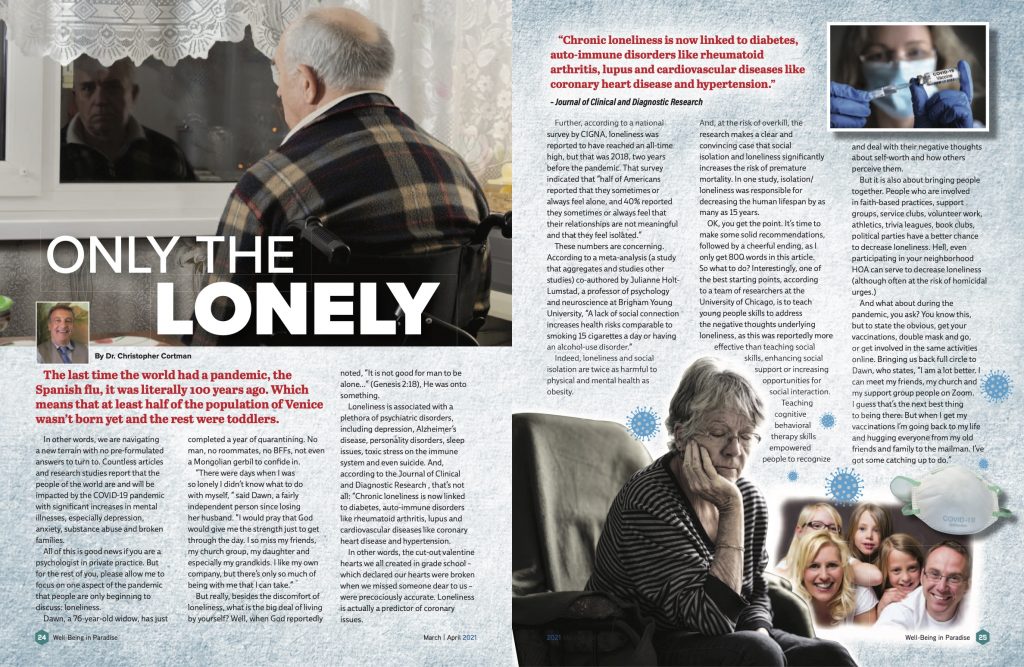Article written for the Venice Gondolier’s Well Being in Paradise Magazine | March/April 2021
The last time the world had a pandemic, the Spanish flu, it was literally 100 years ago. Which means that at least half of the population of Venice wasn’t born yet and the rest were toddlers.
In other words, we are navigating a new terrain with no pre-formulated answers to turn to. Countless articles and research studies report that the people of the world are and will be impacted by the Covid pandemic with significant increases in mental illnesses, especially depression, anxiety, substance abuse and broken families-but all of this is good news if you are a psychologist in private practice. But for the rest of you, please allow me to focus on one aspect of the pandemic that people are only beginning to discuss: loneliness.
Dawn, a 76-year-old widow, has just completed a year of quarantining. No man, no roommates, no BFF ‘s, not even a Mongolian gerbil to confide in. “There were days when I was so lonely I didn’t know what to do with myself, “ said Dawn, a fairly independent person since losing her husband. “I would pray that God would give me the strength just to get through the day. I so miss my friends, my church group, my daughter and especially my grandkids. I like my own company, but there’s only so much of being with me that I can take.“
But really, besides the discomfort of loneliness, what is the big deal of living by yourself? Well, when God reportedly noted “it is not good for man to be alone…” (Genesis 2:18), HE was onto something.
Loneliness is associated with a plethora of psychiatric disorders, including depression, Alzheimer’s disease, personality disorders, sleep issues, toxic stress on the immune system and even suicide. And, according to the Journal of Clinical and Diagnostic Research , that’s not all: “Chronic loneliness is now linked to diabetes, auto-immune disorders like rheumatoid arthritis, lupus and cardiovascular diseases like coronary heart disease and hypertension. “ (Mushtaq, Shoib, 2014)
In other words, the cut-out valentine hearts we all created in grade school- that declared our hearts were broken when we missed someone dear to us-were precociously accurate.Loneliness is actually a predictor of coronary issues.
Further, according to a national survey by CIGNA, loneliness was reported to have reached an all-time high, but that was 2018, two years before the pandemic! Their survey indicated that “half of Americans reported that they sometimes or always feel alone, and 40% reported they sometimes or always feel that their relationships are not meaningful and that they feel isolated.” (Novotny, 2019)
These numbers are concerning, according to a meta-analysis (a study that studies other studies) co-authored by Julianne Holt-Lumstad, a professor of psychology and neuroscience at BYU, “A lack of social connection increases health risks comparable to smoking 15 cigarettes a day or having an alcohol use disorder.“ Indeed, loneliness and social isolation are twice as harmful to physical and mental health as obesity. (Perspectives on Psychological Science , Volume 10, number two, 2015)
And, at the risk of overkill, the research makes a clear and convincing case that social isolation and loneliness significantly increases the risk of premature mortality. In one study, isolation/loneliness was responsible for decreasing the human lifespan by as many as 15 years. (Former surgeon general, Vivek Nurthy)
OK, you get the point. It’s time to make some solid recommendations, followed by a cheerful ending, as I only get 800 words in my article. So what to do? Interestingly, one of the best starting points, according to a team of researchers at the University of Chicago, is to teach young people skills to address the negative thoughts underlying loneliness, as this was reportedly more effective than teaching social skills, enhancing social support or increasing opportunities for social interaction. (Personality and Social Diagnostics review, 2011) Teaching cognitive behavioral therapy (CBT) skills empowered people to recognize and deal with their negative thoughts about self-worth and how others perceive them.
But it is also about bringing people together. People who are involved in faith-based practices, support groups, service clubs, volunteer work, athletics, trivia leagues, book clubs, political parties, Hell, even participating in your neighborhood HOA can serve to decrease loneliness, (although often at the risk of homicidal urges.)
And what about during the pandemic, you ask? You know this, but to state the obvious, get your vaccinations, double mask and go, or get involved in the same activities online. Bringing us back full circle to Dawn, who states, “I am a lot better. I can meet my friends, my church and my support group people on zoom. I guess that’s the next best thing to being there. But when I get my vaccinations I’m going back to my life and hugging everyone from my old friends and family to the mailman. I’ve got some catching up to do.”

